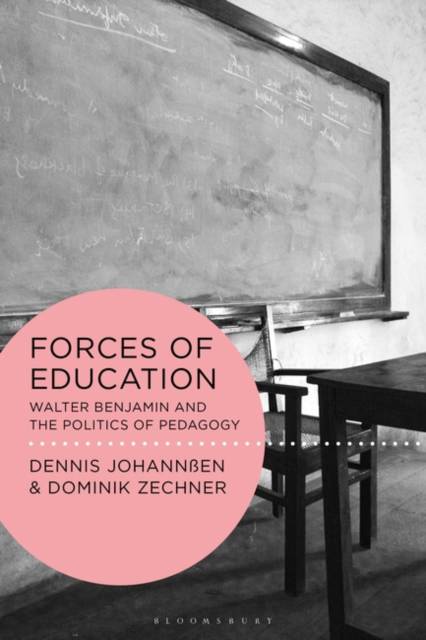
Bedankt voor het vertrouwen het afgelopen jaar! Om jou te bedanken bieden we GRATIS verzending (in België) aan op alles gedurende de hele maand januari.
- Afhalen na 1 uur in een winkel met voorraad
- In januari gratis thuislevering in België
- Ruim aanbod met 7 miljoen producten
Bedankt voor het vertrouwen het afgelopen jaar! Om jou te bedanken bieden we GRATIS verzending (in België) aan op alles gedurende de hele maand januari.
- Afhalen na 1 uur in een winkel met voorraad
- In januari gratis thuislevering in België
- Ruim aanbod met 7 miljoen producten
Zoeken
Forces of Education
Walter Benjamin and the Politics of Pedagogy
€ 67,95
+ 135 punten
Omschrijving
Bringing Walter Benjamin into dialogue with the urgent issues facing educational institutions today, this is the first comprehensive exploration of his philosophy of education and pedagogy.
In recent years, problems concerning the practice of education have become central to the critical discourse in the humanities: from debates regarding "deplatforming" and the redefinition of free speech on campus to the digitization of learning and the ethics of mentorship. But where do we go from here? This volume argues that Walter Benjamin's writing offers critical tools to rethink the purposesof education and the institutional formsit should assume.
Reaching from his earliest writings during his involvement with the antebellum German Youth Movement to his late essays on history, theatre, and new media, the authors here explore how Benjamin argued against education as an institutional task subject to a scientific discipline. They show instead how he took his cue from language as a medium of subtle understanding to critically analyze the forms of violence inherent in the concept and history of education. For Benjamin, education was the lever to political reform. For him, the experience of youth should always be at the centre of considerations.
Written by leading international scholars, Walter Benjamin and Education both contextualizes Benjamin's pedagogy in the trajectory of his own thought and also offers an astute analysis of the value and relevance of his student-focused ideas to the institutional and political challenges of today.
In recent years, problems concerning the practice of education have become central to the critical discourse in the humanities: from debates regarding "deplatforming" and the redefinition of free speech on campus to the digitization of learning and the ethics of mentorship. But where do we go from here? This volume argues that Walter Benjamin's writing offers critical tools to rethink the purposesof education and the institutional formsit should assume.
Reaching from his earliest writings during his involvement with the antebellum German Youth Movement to his late essays on history, theatre, and new media, the authors here explore how Benjamin argued against education as an institutional task subject to a scientific discipline. They show instead how he took his cue from language as a medium of subtle understanding to critically analyze the forms of violence inherent in the concept and history of education. For Benjamin, education was the lever to political reform. For him, the experience of youth should always be at the centre of considerations.
Written by leading international scholars, Walter Benjamin and Education both contextualizes Benjamin's pedagogy in the trajectory of his own thought and also offers an astute analysis of the value and relevance of his student-focused ideas to the institutional and political challenges of today.
Specificaties
Betrokkenen
- Uitgeverij:
Inhoud
- Aantal bladzijden:
- 248
- Taal:
- Engels
- Reeks:
Eigenschappen
- Productcode (EAN):
- 9781350274204
- Verschijningsdatum:
- 27/06/2024
- Uitvoering:
- Paperback
- Formaat:
- Trade paperback (VS)
- Afmetingen:
- 156 mm x 234 mm
- Gewicht:
- 353 g

Alleen bij Standaard Boekhandel
+ 135 punten op je klantenkaart van Standaard Boekhandel
Beoordelingen
We publiceren alleen reviews die voldoen aan de voorwaarden voor reviews. Bekijk onze voorwaarden voor reviews.








